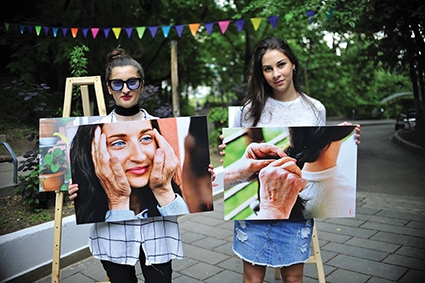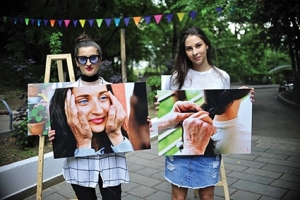Living with Rheumatoid Arthritis: When Even the Little Things are Hard
Aphoto project presentation was organized by The Union of Patients with Rheumatoid Arthritis in New Mziuri, within the framework of an information campaign called Everything is in our Hands. The aim of the event is to raise awareness and spread information about the disease, in order to support early diagnosis and provide adequate treatment on time.
Author of the photos, Goga Chanadiri, depicted the daily life of suffering patients, those simple everyday activities which are so difficult for them to do and that often require great effort.
“My goal was to support raising awareness of RA,” Goga Chanadiri, photographer and supporter told us. “I used photography as a medium to depict the patients so that only their hands would be visible, I wanted to show the society that they also have the right to cuddle their children and grandchildren, play the piano, water the plants, etc. We can’t sacrifice these people to this disease- we should give them the joy of life.”
Inga Mamuchishvili, the Head of the Union of Rheumatoid Arthritis (RA) Patients, the founders Marina Sagaradze and Rusudan Ediberidze and other supporters, addressed the audience and communicated the severity of the disease and accompanying problems. The communicational support of the campaign was conducted by Gepra.
The presentation was also attended by healthcare officials, representatives of medical institutions, doctors, patients and other parties.
Irakli Pavlenishvili, Chairman the Commission of Health Care and Social Issues of Tbilisi City Assembly: “Rheumatoid Arthritis and joint diseases in general are a very serious problem, widely spread throughout the world. The daily burden of the disease is depicted in these photos. If the treatment is not conducted purposefully, it can lead to deplorable results as the disease can develop into a disability. However, timely treatment gives effective outcomes. Days like today are highly welcomed, since drawing attention to problems brings hope and results. The activity and involvement of society is highly important as it plays a crucial role; of course, government should be and is responsible for supporting the treatment of rheumatoid arthritis, for example, children under 18 are fully financed in Georgia. The disease is progressive and is almost incurable, though it can be regulated as a result of well-timed medical interference. Today, we have biological medication which is very effective, but very expensive at the same time, thus is poorly available”.
It is an issue Tbilisi City Hall has been working on as it gathers data and analyzes potential funding. It is already financing three large projects: breast cancer, with a metastatic Herceptin program; an Autism program, working with up to 700 children, and a program of bone marrow transplantation worth about GEL 10 million.
Rheumatoid arthritis is a chronic, progressive, auto-immune disease that causes joint swelling, damage and ultimately leads to the disability of the patient. Statistical data suggests that every hundredth person in the world suffers from the disease. The incidence of disease among women is three times higher than in men. Rheumatoid arthritis may begin at any age but occurs mostly in people aged 35 to 50.
Rheumatoid arthritis may damage all joints, but affects mostly that of hands, legs and wrists. The progressive damage is accompanied by a person’s continuously decreasing ability to work and move independently.
RA patients are unable to conduct such simple activities as for instance combing their hair, walking up stairs, cooking, etc. In developing countries, more than half of patients lose their job and sources of income just 10 years after diagnosis.
RA patients may experience systematic complications like cardiovascular or lung diseases, osteoporosis, anemia etc. RA patients’ life span may decrease by 5-10 years. Early diagnosis and treatment hinders disease progression and prevents irrevocable damage to joints. However, unfortunately in Georgia, most of the diagnosed patients are unable to receive adequate treatment because of lack of financial stability for medication.
Inga Mamuchishvili: “I’m a pediatrician and RA patient. I was diagnosed in 2011 and at the time thought my life was over, as even the easiest things seemed very difficult for me. I couldn’t even lift a glass with my hand, walk, or go to work, where about 20-25 children were waiting for me daily. I began treatment which proved completely fruitless. Yet when I started treatment with biological medication, the disease quickly moved into remission. These drugs are needed on a continuous basis and are very expensive. The disease is incurable, and sufferers need them in order not to develop deformations, not to become disabled, or chained to a wheelchair. However, the medication is almost unavailable for ordinary people. Thus, we founded the Union of Patients with Rheumatoid Arthritis and call on every institution which can stand beside us to get involved.”
Rusudan Ediberidze, RA patient: “I was diagnosed when I was 23. It started to develop from the upper jaw joint; I believe that stress provoked the disease and I’ve been suffering for 20 years now. The form of RA is quite severe, the destruction, deformation and erosion of joints is developing and I already need surgical intervention. Despite continuous treatment, which hasn’t been interrupted at any stage, the desired results were not achieved. I believe that biomedication and alternative medicine are effective in the battle against the disease and experience has proved this”.
An online petition asking for increased availability of the biological medication for RA patients was published at the end of the event, addressed to the Ministry of Health, Labor and Social Affairs and the Tbilisi Assembly. RA patients wrote their wishes on a special banner displayed at the event.
The Union of Patients with Rheumatoid Arthritis was founded in 2016, by which Georgia joined the World Rheumatoid Arthritis Day celebrated annually since 2012. The main goal of the organization is to increase public awareness of the disease; provide adequate treatment for patients resistant to standard therapy (those with particularly serious forms); communicate continuously with the Association of Rheumatology of Georgia, representative of pharmaceutical companies and other medical institutions to share and exchange disease-related news, methods and information about the latest medications.












